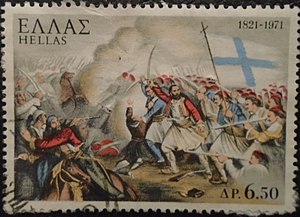Битва при Маніакі
| Ця стаття містить правописні, лексичні, граматичні, стилістичні або інші мовні помилки, які треба виправити. |
Битва при Маніакі відбулася 20 травня 1825 року біля Маніакі, Греції між османськими єгипетськими військами на чолі з Ібрагімом — пашею і грецькими військами під керівництвом Папафлессас.[1]
| Битва при Маніакі | |||||||
|---|---|---|---|---|---|---|---|
| Грецька революція | |||||||
 | |||||||
| Координати: 37°04′35″ пн. ш. 21°46′21″ сх. д. / 37.07638900002777405° пн. ш. 21.77250000002777952° сх. д. | |||||||
| |||||||
| Сторони | |||||||
| Командувачі | |||||||
| Григоріос Папафлессас † П'єрос Войдіс † |
Ібрагім-паша | ||||||
У битві перемогли єгипетські війська. Обидва грецькі полководці, Папафлессас і П'єрос Войдіс, були вбиті в цьому бою.
Битва
ред.Після грецької поразки у Сфактрії та падіння Неокастро Папафлессас вирішив дати відсіч єгиптянам. На чолі 3000 грецьких солдатів Папафлессас рушив на південь, щоб образити Ібрагіма. Він вирішив розташувати свої війська біля гори Малія, щоб мати хороший вид на рівнину біля Наваріно. З вибраної позиції Папафлессас чекав на сили Ібрагіма.[1] У ніч з 19 на 20 травня, побачивши величезні війська Ібрагіма, багато греків з ряду Папафлессаса дезертували.[2] Лише половина грецьких військ залишилася на своїх позиціях з Папафлессасом та П'єросом Войдісом.
Ібрагім, особисто очолюючи війська чисельністю понад 6000 солдатів, просунувся до грецьких позицій.[1] Філіпс називає єгипетські сили "незліченними". [3] Папафлессас виголосив красномовну промову, піднявши моральний дух греків, які вирішили залишитися і битися.[4] Греки міцно трималися на своїх позиціях, коли єгиптяни армії Ібрагіма атакували, але врешті-решт були розгромлені. Після битви значна частина греків (800 або 1000 осіб, включаючи Папафлессаса) та чотириста єгиптян загинули.[5] Голова і тіло Папафлессаса були вилучені й поставлені вертикально на стовпі; не в безчесті, а як знак поваги до мужнього ворога. Згідно з легендою, Ібрагім навіть поцілував його в голову і сказав: "Якби всі греки були схожі на нього, я б не брав на себе відповідальність за цю кампанію".[6]
Наслідки
ред.Попри поразку Папафлессаса, сама битва допомогла зміцнити моральний дух інших греків і сприяти руху за незалежність Греції.[1] [7]
Посилання
ред.
- ↑ а б в г Finlay, p. 75. «He quitted Nauplia with great parade, attended by a body of veteran soldiers; and when he reached the village of Maniaki, in the hills to the east of Gargaliano, his force exceeded three thousand men. The bold priest possessed no military quality but courage. He posted his troops in an ill-selected position and awaited the attack of Ibrahim, who advances in person to carry the position at the head of six thousand men on 1 June. Many of the archimandrite's troops, seeing the superior force of the Egyptians, deserted during the night, and only about fifteen hundred men remained. The pasha's regulars were led on to storm the Greek intrenchments in gallant style, and a short and desperate struggle ensued. The Greeks were forced from their position before they fled. The affair was the best contested during the war, for a thousand Greeks perished by the Arab bayonets, and four hundred Arabs lay dead on the field. In spite of the defeat and the severe loss sustained by the Greeks, they gained honour and courage by the battle of Maniaki.»
- ↑ Phillips, pp. 177-178. "With a body of 3,000 troops, Dikaios marched southward, and at Maniaki, on a spur of Mount Malia, took up a position commanding a view of the plain towards Navarino, and there awaited the arrival of the Egyptians. Presently the plain below them seemed to be covered with marching battalions; and, when the Greeks saw an apparently innumerable host advancing upon them with a steadiness and fateful deliberation as disconcerting as it was strange to their experience, many of them lost courage and fled."
- ↑ Phillips, pp. 177-178.
- ↑ Phillips, p. 178. "About a thousand, however, held their ground and Dikaios stimulated their courage with the eloquence which made him so great a power in the revolt. Victory was always possible, he cried, but if they fell, many Turks would also bite the dust, and this battle would be as famous among posterity as the immortal stand of Leonidas and his three hundred Spartans. For once, courageous words were followed by courageous deeds."
- ↑ Phillips, p. 178. "The egyptians advanced to the attack; but the Greeks held their ill-constructed entrenchments with obstinate valour. At last, however, the discipline and numbers of the enemy prevailed; but not before 800 of the Greeks and over 400 egyptians had fallen. Dikaios himself fought like a lion; and the headless trunk of the burly priest was discovered surrounded by piles of slain egyptians."
- ↑ Phillips, p. 178-179. "Ibrahim caused the head to be sought; and, when it was found, had it set upon the trunk, and the figure of the dead leader placed upright against a post." Ibrahim kissed the head of the dead Papaflessas and said "If all Greeks were like him, I would not take charge of this campaign".
- ↑ Phillips, p. 179. "The exploit of Dikaios revived the drooping courage of the Greeks; and when Kolokotrones, raised from his prison to the supreme command, took the field, he made his dispositions with a certain confidence."